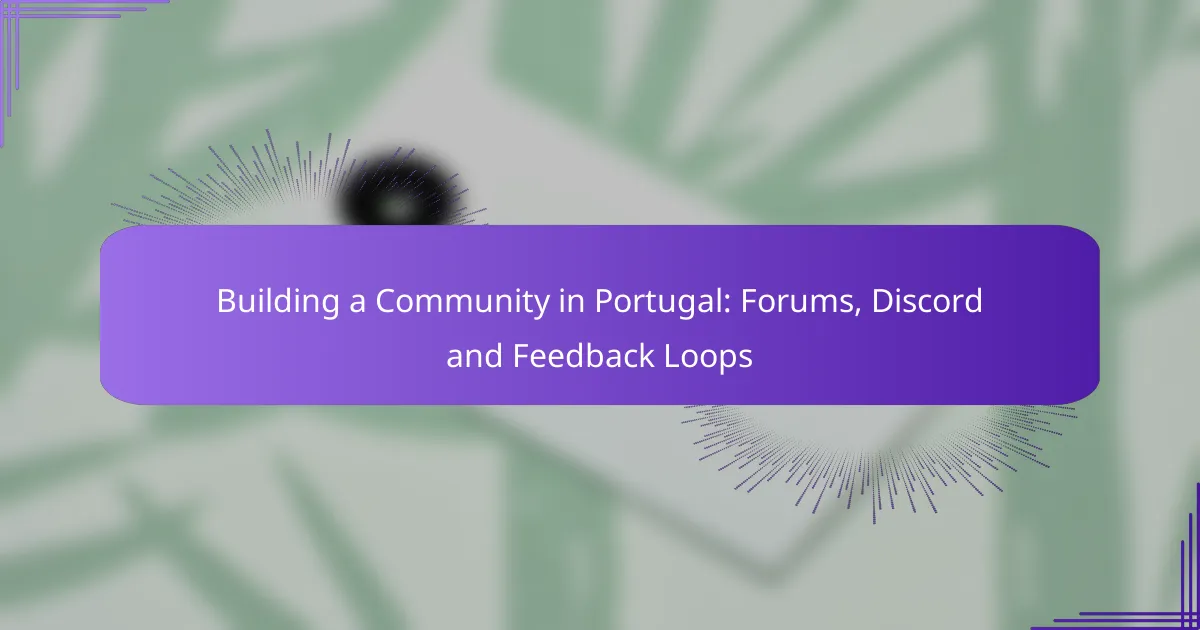Building a vibrant online community in Portugal requires leveraging interactive platforms such as Discord, forums, and social media to foster engagement and collaboration among members. By implementing effective feedback loops, communities can continuously adapt to the needs and preferences of their members, enhancing overall satisfaction and participation.
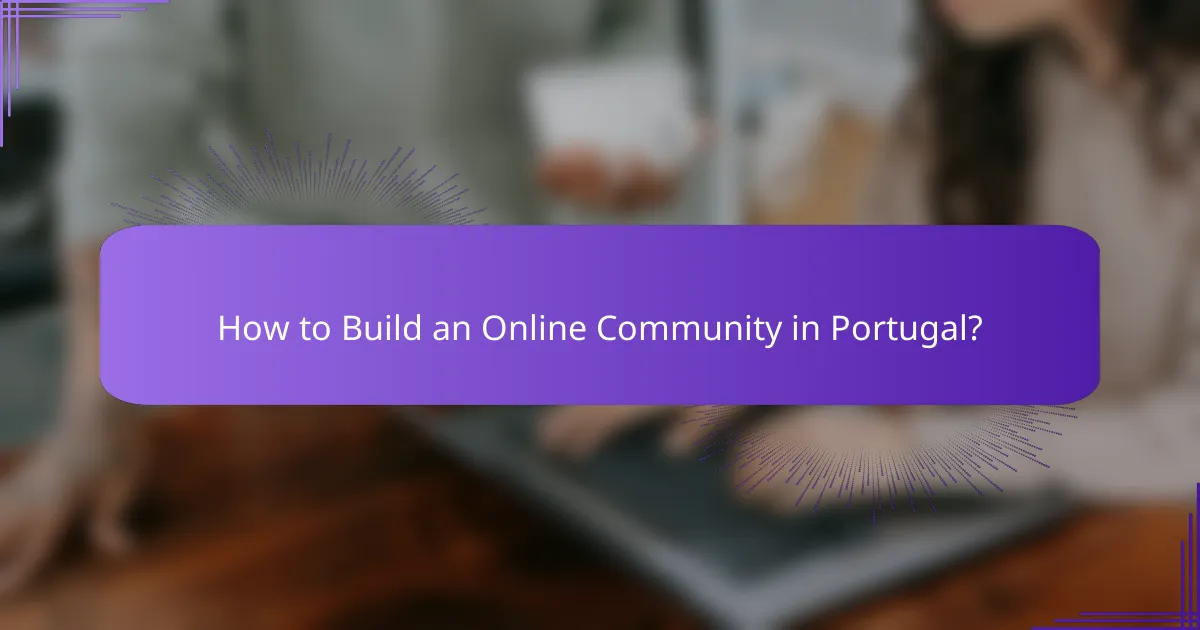
How to Build an Online Community in Portugal?
Building an online community in Portugal involves creating interactive spaces where members can engage, share, and collaborate. Utilising platforms like Discord, forums, and social media can foster connections and enhance participation.
Utilise Discord for Real-Time Interaction
Discord is an excellent platform for fostering real-time interaction within your community. It allows members to communicate via text, voice, and video, creating a dynamic environment for discussions and collaboration.
To effectively use Discord, create dedicated channels for different topics and activities. Encourage members to participate in voice chats or live streams, which can significantly enhance engagement and build relationships.
Create Forums for Structured Discussions
Forums provide a structured environment for discussions, allowing members to post questions, share insights, and engage in deeper conversations. They are ideal for topics that require more thought and detail than quick chats.
Consider using platforms like phpBB or Discourse to set up your forum. Organise discussions into categories and threads to make navigation easier. Regularly monitor and moderate the forum to maintain a positive atmosphere.
Leverage Social Media Platforms
Social media platforms like Facebook, Instagram, and Twitter can help you reach a broader audience and promote your community. They are effective for sharing updates, events, and engaging content that can attract new members.
Focus on creating shareable content that resonates with your target audience. Use polls, questions, and interactive posts to encourage participation and feedback, which can help you refine your community’s direction.
Host Virtual Events and Webinars
Hosting virtual events and webinars can significantly enhance community engagement by providing valuable content and opportunities for interaction. These events can cover various topics relevant to your community’s interests.
Plan events that encourage participation, such as Q&A sessions or workshops. Promote these events through your Discord, forums, and social media. Ensure to follow up with attendees for feedback to improve future events.

What Are Effective Feedback Loops?
Effective feedback loops are structured methods for gathering and analysing input from community members to improve engagement and satisfaction. By continuously collecting feedback, communities can adapt and evolve based on the needs and preferences of their members.
Implement Surveys and Polls
Surveys and polls are powerful tools for collecting quantitative and qualitative feedback from community members. They can be distributed through various platforms, such as email, social media, or directly within community forums. Aim to keep surveys concise, ideally under 10 questions, to encourage participation.
Consider using a mix of multiple-choice questions and open-ended responses to capture a broad range of insights. For example, a simple poll asking members about their preferred event times can help in scheduling community activities effectively.
Encourage User-Generated Content
User-generated content (UGC) fosters a sense of ownership and belonging within the community. Encourage members to share their experiences, ideas, and creations through forums or dedicated channels on platforms like Discord. This not only enriches the community but also provides valuable feedback on what resonates with members.
To incentivise UGC, consider hosting contests or featuring top contributions in newsletters or community highlights. This can motivate members to engage more actively and provide insights into their preferences and interests.
Conduct Regular Community Meetings
Regular community meetings create opportunities for direct interaction and feedback exchange. These meetings can be held virtually via platforms like Zoom or Discord, allowing members to participate easily regardless of location. Schedule them monthly or quarterly to maintain consistent engagement.
During these meetings, encourage open discussions about community initiatives, challenges, and suggestions for improvement. Taking notes and summarising key points can help in tracking feedback and implementing changes effectively.

Which Platforms Are Best for Community Building in Portugal?
For building a community in Portugal, platforms like Discord, Reddit, and Facebook Groups are particularly effective. Each offers unique features that cater to different interests and engagement styles, making them suitable for various community-building efforts.
Discord for Gaming and Tech Communities
Discord is a leading platform for gaming and tech communities, providing real-time communication through voice, video, and text channels. Its user-friendly interface allows members to create or join servers tailored to specific interests, making it ideal for fostering engagement among like-minded individuals.
To maximise your community’s potential on Discord, consider organising events such as game nights or tech discussions. Encourage members to participate actively by creating roles and rewards for contributions, which can enhance the overall experience and retention.
Reddit for Diverse Discussions
Reddit serves as a versatile platform for diverse discussions, hosting numerous subreddits that cater to various topics and interests. This structure allows users in Portugal to engage in conversations ranging from local news to niche hobbies, fostering a sense of community among participants.
When using Reddit, focus on creating a subreddit that reflects your community’s interests. Regularly post engaging content and encourage members to share their experiences. Be mindful of Reddit’s guidelines to maintain a positive environment and avoid common pitfalls like spam or off-topic discussions.
Facebook Groups for Local Engagement
Facebook Groups are effective for local engagement, allowing users in Portugal to connect with their community based on geographic location or shared interests. These groups facilitate discussions, events, and resource sharing, making them ideal for building a supportive network.
To create a successful Facebook Group, clearly define its purpose and guidelines. Regularly post updates, encourage member interactions, and host local events to strengthen ties. Be aware of privacy settings and group rules to ensure a safe and welcoming atmosphere for all members.
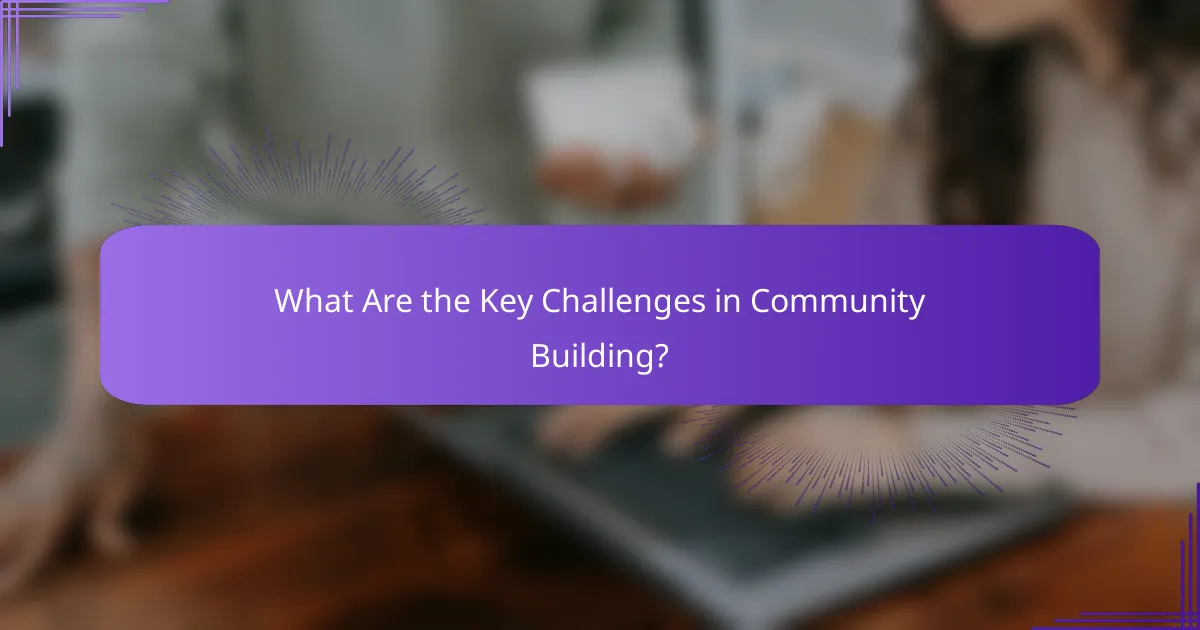
What Are the Key Challenges in Community Building?
Building a community involves several key challenges, including maintaining engagement, managing conflicts, and attracting new members. Addressing these issues effectively is crucial for fostering a vibrant and sustainable community.
Maintaining Engagement Over Time
Keeping members engaged over time requires consistent interaction and value delivery. Regular events, discussions, and updates can help maintain interest and participation.
Consider implementing a content calendar that outlines activities for the month, such as themed discussions or guest speakers. This helps members anticipate and participate in community events.
Utilise feedback loops to understand what members find engaging. Surveys or polls can provide insights into their interests, allowing you to tailor activities accordingly.
Managing Conflicts and Moderation
Conflict is inevitable in any community, and effective moderation is essential to maintain a positive environment. Establish clear guidelines for behaviour and ensure all members are aware of them.
Designate moderators who can address disputes fairly and promptly. Training these individuals on conflict resolution techniques can help them manage issues without escalating tensions.
Encourage open communication among members to address grievances before they escalate. Creating a dedicated channel for feedback can facilitate this process.
Attracting New Members
Attracting new members is vital for community growth. Utilise social media platforms, local events, and partnerships with relevant organisations to reach potential members.
Offer incentives for joining, such as exclusive content or access to special events. This can motivate individuals to become part of your community.
Highlight the benefits of membership clearly, such as networking opportunities or access to resources. A well-crafted value proposition can significantly enhance your recruitment efforts.
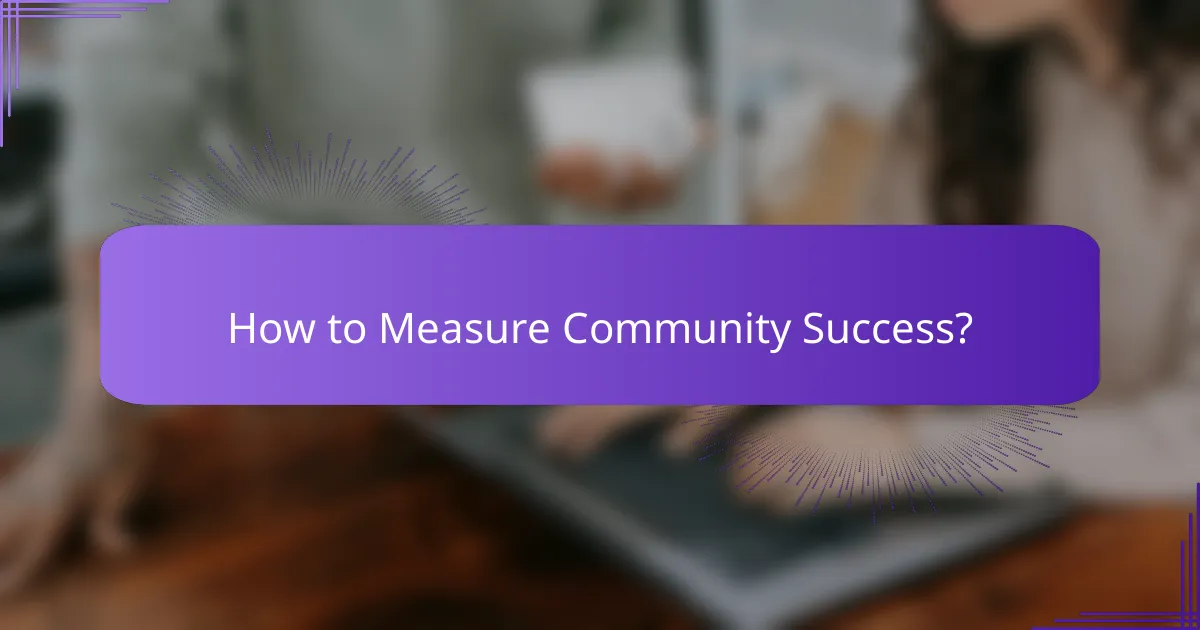
How to Measure Community Success?
Measuring community success involves assessing various metrics that reflect growth, engagement, and satisfaction among members. Key indicators include member retention, active participation levels, and feedback quality.
Track Member Growth and Retention Rates
Monitoring member growth and retention rates is crucial for understanding the health of your community. Track the number of new members joining over specific periods and compare it to the number of members leaving. A retention rate above 70% is generally considered healthy.
Consider using tools like Google Analytics or community management platforms to visualise these trends. Regularly review these metrics to identify patterns and adjust your strategies accordingly.
Analyse Engagement Metrics
Engagement metrics provide insights into how actively members participate in discussions and activities. Track metrics such as the number of posts, comments, and reactions within your forums or Discord channels. Aim for a consistent increase in these interactions over time.
Utilise analytics tools to measure engagement rates, which can help you identify peak activity times and popular topics. This data can guide content creation and event planning to better meet community interests.
Gather Qualitative Feedback
Qualitative feedback offers valuable insights into member experiences and satisfaction. Conduct surveys or host feedback sessions to gather opinions on community initiatives, events, and overall atmosphere. Aim for a response rate of at least 20% for meaningful data.
Encourage open-ended responses to capture detailed insights. Regularly review this feedback to identify areas for improvement and to celebrate successes, fostering a sense of belonging and investment among members.
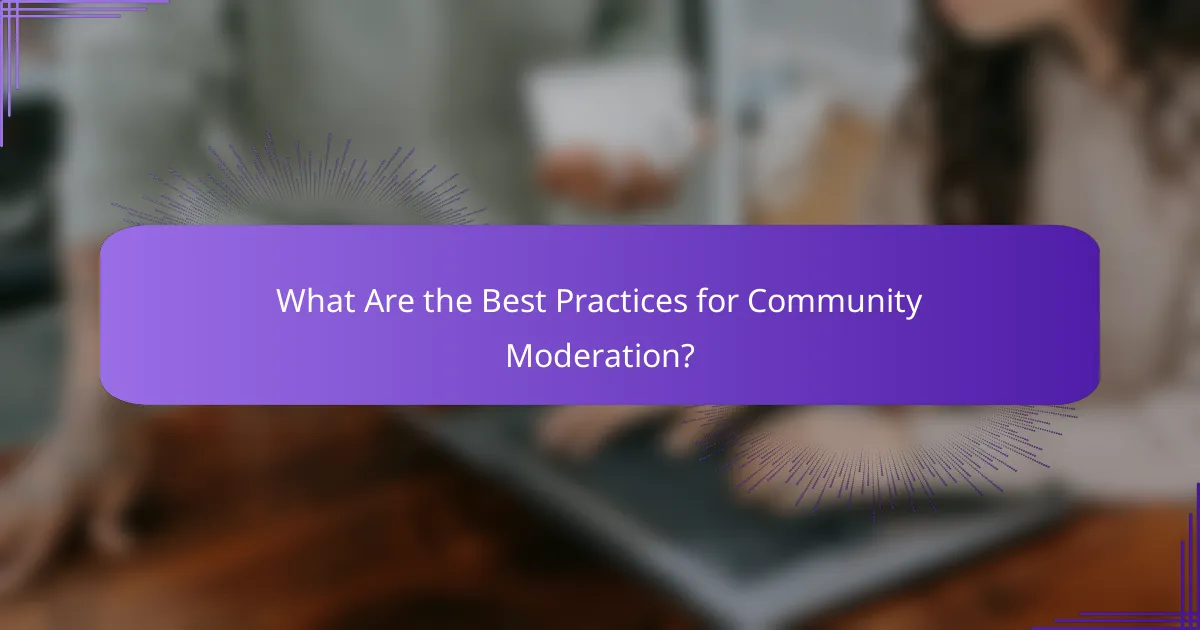
What Are the Best Practices for Community Moderation?
Effective community moderation involves establishing clear rules, fostering a respectful environment, and actively engaging with members. These practices help maintain a positive atmosphere and encourage constructive interactions.
Establish Clear Community Guidelines
Clear community guidelines are essential for setting expectations and maintaining order. They should outline acceptable behaviour, prohibited actions, and the consequences for violations. This clarity helps prevent misunderstandings and promotes a respectful environment.
When creating guidelines, consider including categories such as harassment, spam, and content appropriateness. Use straightforward language and examples to illustrate what is acceptable and what is not. For instance, specify that personal attacks or hate speech will not be tolerated.
Regularly review and update these guidelines to reflect the evolving needs of the community. Encourage feedback from members to ensure the guidelines remain relevant and effective.
Encourage Active Participation
Active participation is crucial for a thriving community. Encourage members to engage by asking questions, sharing experiences, and providing feedback. This interaction fosters a sense of belonging and ownership among members.
Consider hosting regular events, such as Q&A sessions or topic discussions, to stimulate engagement. Additionally, recognise and reward active contributors to motivate others to participate. Simple shout-outs or small incentives can significantly boost involvement.
Implement Feedback Loops
Feedback loops are vital for understanding community needs and improving moderation practices. Establish channels for members to share their thoughts on community guidelines, moderation actions, and overall experiences.
Utilise surveys, suggestion boxes, or dedicated discussion threads to gather input. Actively respond to feedback and make necessary adjustments to demonstrate that member voices are valued. This transparency builds trust and encourages ongoing dialogue.
